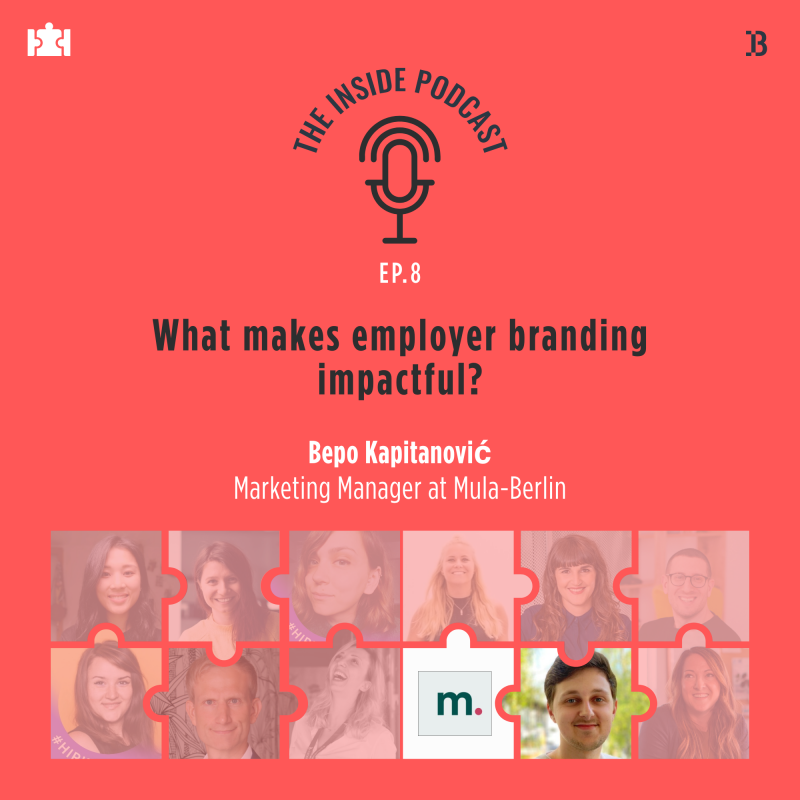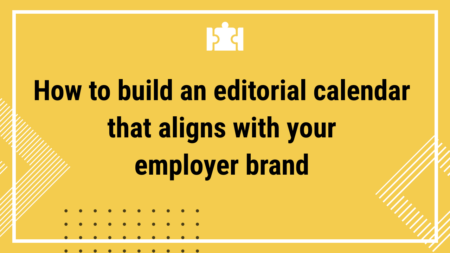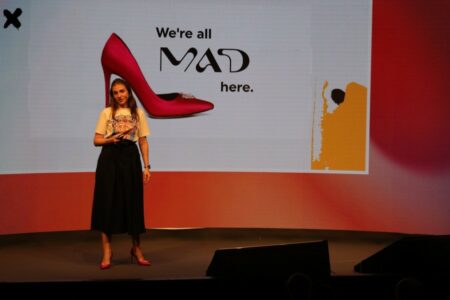Overview
Regardless of your experience in HR, employer branding, or talent acquisition, in Ep.8 of The Inside Podcast, you’ll be listening to Bepo Kapitanović (Marketing Manager at Mula-Berlin) shed some light on what it’s like to be a marketing manager in an employer branding company.
What you’ll learn by listening
By listening to the podcast, you’ll learn more about:
- How to create impact among other marketers
- How automation works in employer branding
- Why being human matters more now than ever
- Marketing & employer branding – a match made in heaven
- The importance of stories, values & proper communication in marketing
- Employer branding is not about numbers, but about creating the right environment for people
About the company
mula. is a fast-growing HR- and Tech Startup integrating and streamlining the design, purchase, storage and distribution of promotional goods in the most efficient way possible. They are building a powerful digital platform with unique capabilities to revolutionise and emphasise the importance of employer branding. Visit now the website.
Enjoy listening to Ep.8 of The Inside Podcast on Spotify!
Podcast transcription – What makes employer branding impactful with Bepo Kapitanović @Mula-Berlin
Georgiana: Hi, everyone! This is Georgiana and you’re listening to The Inside Podcast where people from various companies share their insights into what it’s like to be a tech talent manager, recruiter, or employer branding manager. Our topic for today is actually marketing-related or employer branding related. And I’m really happy to be talking to someone who actually is also marketer, and who works in a company that does exactly this: employer branding. So Bebo, welcome to our podcast. It’s good to see you and hear from you today.
Bepo: Happy to be on the podcast today. I’m excited to talk about Mula, and the work that I do there.
Georgiana: For sure. As I’m working for a while in employer branding, it was really rewarding to see that there’s a company in Berlin that specializes in that. That being said, please tell me a bit more about the company you currently work for. What is their business model exactly? And what does your role with Mula consist of?
Bepo: To keep it short, Mula is a B2B platform for merchandise, employer branding, and onboarding new employees. So it’s not just focusing on one tool or topic, but as a full service provider in the B2B merchandise area. Our platform model can be used as a tool. On our website, you can start with finding and sourcing the right products, search for uploading your designs, we have a designer who makes mockups for you. And in the end, you can store and ship with us. So you don’t need to touch the product before getting it. That’s the business model. And again, you can use it for branding, and for the onboarding part, you have these kinds of onboarding boxes, or you can onboard your new employees remotely or in the office. In simple terms, you can mix up things that fit your brand.
Georgiana: What’s your favorite thing about being a marketing manager for an employer branding company?
Bepo: What’s different from my previous jobs is really, that I have an impact on the daily work of other marketers and office managers. We’re changing things because I have a lot of conversations with our customers. Everything used to be done manually – trying to find a shirt involved going to an offline store to print it, which meant losing a lot of time, especially if the quality is low. As a marketer, you don’t have much time. You need to really be fast in your things, time them, or you lose a lot of impact on your daily work. It’s really crazy, and right now, with Mula you just make one click and it’s done for you. Managing everything from one platform is life-changing for our customers, but also for branding managers and HR managers.
Georgiana: What is currently a project that you and Mula is managing and that you really like? I suppose there are several but if you had to pick just one, what would be?
Bepo: We’re sharing all kinds of projects, such as the one we have currently with Panda, for example. So you can see there are a few of them. But I wouldn’t pinpoint just one project. It’s more like a topic for the 2020 Christmas season linked to the Christmas party, especially now that companies cannot do physical parties anymore. You see, a lot of companies have had to change the way they send out gifts.
Georgiana: Indeed.
Bepo: It’s not just us approaching things differently. We’re working with our partners to send out positive vibes, surprise employees, making really happy about getting a gift. Being part of this is really fun. I see posts on Instagram and LinkedIn of employees that are happy about getting our staff home. And, yeah, this is really awesome.
Georgiana: I think so, especially in these lockdown times when people are working from home and when you’re at home all the time. I think it really makes a difference to see that your employer actually thinks about you and that Christmas is celebrated in some sort of way. Okay, and now, a question more on the employer branding side? I’m really curious to see your take on it because you’re a marketer, just as I am. And we’re both somehow working in two areas at the same time – in employer branding and marketing. My question is – is employer branding more about human resources? Or about team management or internal or external marketing? What do you think?
Bepo: As a marketer, I would say the communication part. I used to work in a hotel for while as a customer service manager, and I saw a lot of different angles. I see it a bit different than just as a marketing topic. The best case for me would be to have the combination of both and be someone who cares about people, the emotional part of the company, and the environment. But you have the communication outside and inside. So in this case, you have HR and marketing combined.
Georgiana: I totally agree. There has to be some work done at the confluence between the two areas and preferably, a strong communication, a very good collaboration between the two departments, HR and marketing. I think it doesn’t really happen yet in most companies. But that’s a very long topic, which I will not go into right now.
Bepo: If you had asked me about employer branding 10 years ago, I wouldn’t have been able to tell you much. But now it’s totally different.
Georgiana: I agree. When when we were doing only digital marketing campaigns about four years ago, we were asked at some point by one of our tech clients to do an employer branding campaign and help them recruit better because they were having trouble recruiting. And I said, “What is that? What do you mean an employer branding campaign?” And they said, you know, it’s like a marketing campaign only you direct messages towards our prospective employees, not towards our clients. And, yeah, that’s basically how we, at Beaglecat started with it.
I think things have changed a lot, but not as much as I would have liked it anyway. Being in touch with people in both marketing and employer branding and talent management in Berlin, I know for a fact that there’s a lot of space for improvement. Hopefully, these discussions can also contribute a little bit, at least a tiny bit. Tell me about the book that you really liked, and that you found influential.
Bepo: Yeah, I need to disappoint you. Because I’m not really reading books. But I do enjoy listening to podcasts a lot. I can recommend a podcast that I like to listen to. I think it’s pretty known, the OMR Podcast. They have two different angles. They have an educational channel where you get insights, really nerdy stuff about marketing and performance marketing, for example, and another channel where you get insights from companies and founders, their stories, how their brands were built.
Georgiana: Okay, cool. Thank you. Just to look a bit on the funny side, what’s the funniest thing that happened in your career so far? Like, like a work mistake, for example?
Bepo: The funniest thing is about I tried to make up the story, I was thinking about it, like, what was funny that I made wrong. And I was writing something down and telling it to one person in the company. It wasn’t funny at all. So okay, the story at the end, my mistakes are, usually it hurts a bit. And when you’re getting over it, you can laugh about it. So, yeah, no good hands on that. But it’s better to be to laugh a little bit about this then.
Georgiana: I know what you mean. And I think we all make mistakes and in what we do in our roles, and also in our personal lives. As you said, we only laugh about them. Sometimes years afterward, actually, for a while you just don’t want to think about them. Because it’s, it’s quite hurtful.
Bepo: Stories and mistakes made in the past can be fun for you, but not for anyone else.
Georgiana: I agree. Okay, that’s good for a change. I’ve often heard managers claim that there is hardly any need for any concrete employer branding tactics in the company. Either they’re too small, or they’re too young, or they don’t need it because they’re good. Anyway, they are a rockstar company. So they don’t need it. Why should a company look towards employer branding nowadays?
Bepo: Things changed over the year. From my perspective, it’s not about the money and the role anymore. It’s about the company itself. Which stories behind, which values do they live after? And as I communicate with them, I feel if there’s a story behind it, if they loved working at the company, and what changed. That’s why employer branding is getting more and more important. It was always important, but now it’s coming up even more. It is divided into two parts: 1. internal – creating a team, getting the team together, motivate them, building the ideal environment. 2. external – on the other hand, it’s also an awesome topic. Even more this year, like finding new talents, it’s getting more and more competitive. A lot of startups are coming up with small names. For them, it’s tough to find people.
I guess even the big brands have issues with finding the right talent, trying to find new ways to attract people to start working for them. And their employer branding is taking a part of it. They seem like they care about people. So like with the onboarding box topic, I get something positive at the beginning of your start. And this is where I think employer branding is taking off. And I know it’s on the discussion part. If you would maybe talk to the founders, everything is related to the revenue behind.
Employer branding doesn’t have a direct impact, because it has an impact afterward. Because in the first second, okay, you got a new talent. You don’t know what’s the outcome. But if you find the right people for a team, in the end, the revenue cycle will come. The more they stay with a company, the higher the impact, right? It’s not a number you can touch, but you can feel it in the long run.
Georgiana: For sure, and I don’t have the exact numbers either. But I know that work fluctuation and employee retention is very difficult here in Berlin. Work fluctuation is very high. People change jobs many times because the company doesn’t really fit their expectations. So I believe attracting talent should be one topic or one facet of the topic, and then retaining those people should be the other one. But yeah, we’ll have to wait and see what happens in the years to come.
Most of the employer branding managers that I speak to, and sometimes the HR managers who are in charge of employer branding, are saying it’s very hard for them to demonstrate that what they do really makes an impact and really helps to retain people in the company. So I guess yeah, there have been lots of studies made in that respect. I don’t have to talk academically but for sure things will need to change in the years to come.
Bepo: As I mentioned, it’s getting more and more important, not just to have a number behind the salaries. It’s really all about creating the right environment for people. Who doesn’t take the right step right now will lose the talents in the next year. There are a lot of talents in the market, especially now in Covid times. And yet, only a handful of brands. are committed to finding the right way. Without a doubt, employer branding is a sound option.
Georgiana: For sure. Especially in these stressful times where you don’t have the meetings in person anymore. You don’t go to the office, you don’t drink your coffee with your colleagues. Yeah, these are very challenging times for employer branding managers, for sure. Okay, and that brings me to my last question, which is a hypothetical one. If you had the possibility to do whatever you wanted, on the marketing side, in the company of your dreams, what would that be?
Bepo: It’s a pretty emotional thing. I would really like to drive a campaign. But I would need a high budget for that. Assuming that I had that budget, I would push my campaign everywhere – on TV, on the social media side of the campaigns, and being a part of human beings. It’s not just creating a banner ad that someone is waving away, but about creating an emotional campaign that touches everyone, everywhere. Some like Coca Cola, for example. They make Christmas special every year! That would be a dream of mine.
Georgiana: I think that dream applies to every marketer. As I listen to you speak, I remember how many times I thought about thinking of a creative concept for a campaign that would be visible for everyone everywhere. And that would impress everyone. But it’s difficult. Finding the right idea, finding the budget for it. There’s a lot of constraints there. Thank you so much Bepo for talking to me today. I hope to meet you in person when the lockdown is over. And good luck in your new role with Mula.
Bepo: Yeah, thank you. Thank you.
Georgiana: Thank you for listening to The Inside Podcast. You can find our podcast on Spotify and on Apple Music. And if you want to read more on employer branding or digital marketing content in general, go to beaglecat.com or employerbranding.tech. See you next time!






